The 30 Best Bands of the Past 30 Years
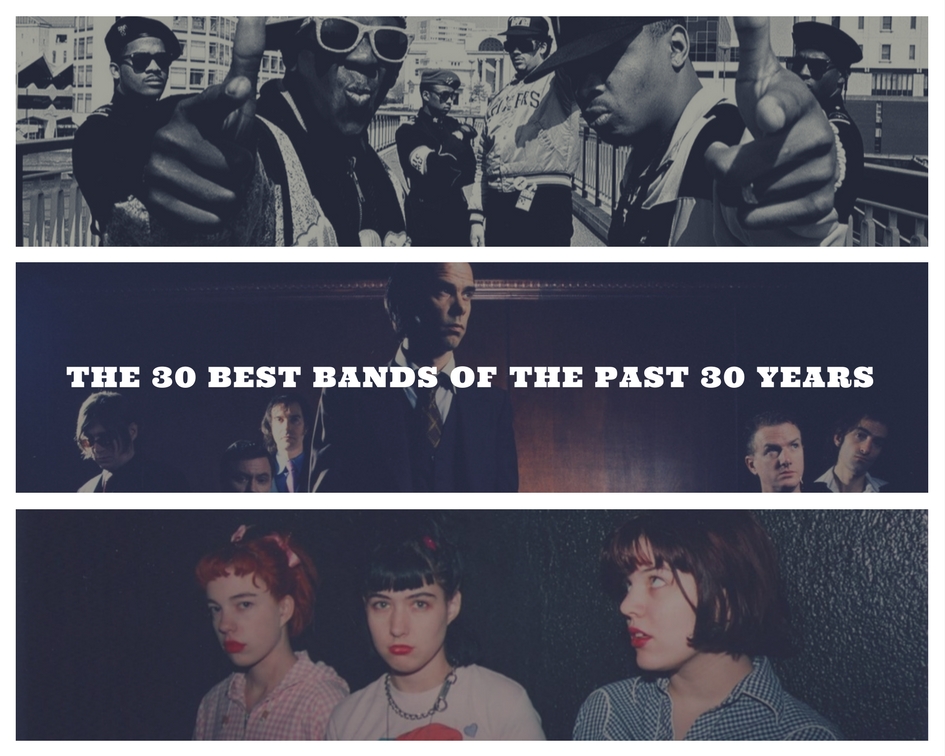
 10. Nine Inch Nails
10. Nine Inch Nails
Combining an uncanny gift for finding melody in dissonant sonic ingredients with meticulous discipline, Trent Reznor and the dozens of studio cohorts who’ve created Nine Inch Nails records, made sui generis heavy music. It remains appealing today because of how much the sound has evolved—from dingy synths and a corrosive guitar style as unique to NIN as Keith Richards’ is to the Stones, to symphonies of decaying machinery—and because its darkness continues to eerily match the national character in ways not always immediately recognizable. Think of how Pretty Hate Machine captures the dramatic, outsized disaffection of youth at the asshole end of the Reagan ’80s. Then skip ahead three decades to the uniquely American rage portrayed and repudiated on Not The Actual Events and ADD VIOLENCE. Between then, you had The Downward Spiral examining the dark underbelly of 1990s optimism and Year Zero predicting a theocratic nightmare borne of the religious right smack in the middle of Bush II.
Beyond all that, NIN endures because of the band’s knack for isolating feelings of heartbreak, dread, paranoia and anger that everyone can relate to, even when—perhaps especially when—they’re expressed without complex language (as on “Head Like A Hole,” “Wish” or “1,000,000,” to name just a few). As Reznor aged, his perspective widened without losing what made NIN’s songs so appealing in the first place.
One last thing: If somehow the only existing documents of Nine Inch Nails were recordings of the band’s live shows, they would still belong on this list. NIN in a live setting is a cavalcade of distortion, swirling lights, raw power and catharsis that must be seen to be believed.
Essential Recordings: Pretty Hate Machine (1989); Broken (1992); The Downward Spiral (1994); The Fragile (1999); Year Zero (2007); ADD VIOLENCE/Not the Actual Events (2017)
Why they’re not #1: We’re still getting used to clean-cut, grown-up, Golden Globes Trent.

9. My Bloody Valentine
What other band of the past thirty years can truly make a music snob this aroused? The critic’s band, the grand artists, the master creators, the constant tinkerers: My Bloody Valentine encompass all of these things. MBV take us to a rare moment in history where a band lurks from the shadows and lays the groundwork for the future of “alternative” rock with just a handful of studio albums. Kevin Shields and company didn’t need a sprawling discography to be the quintessential it band, but rather, a few masterpieces that stood the test of time.
The fact that MBV architect Kevin Shields and guitarist/vocalist Bilinda Butcher suffered fits of Tinnitus during the lengthy recording sessions of their 1991 magnum opus, Loveless, only goes to prove just how committed they were to dismantling any boundaries of “genre.” By doing so, MBV went on to influence future generations of both bedroom producers and zealous audiophiles. Sonic, obsessive, and transcendent, the spirit of My Bloody Valentine thrives today just as much as it did when they nearly bankrupted Creation Records in 1991. – Timothy Michalik
Essential Recordings: Isn’t Anything (1988); Loveless (1991); MBV (2013)
Why they’re not #1: Though MBV opened up galaxies of possibilities for future artists, their limited discography sets them back as a band who, though incredibly influential, wound up closing themselves off from the world after a quick run of albums.
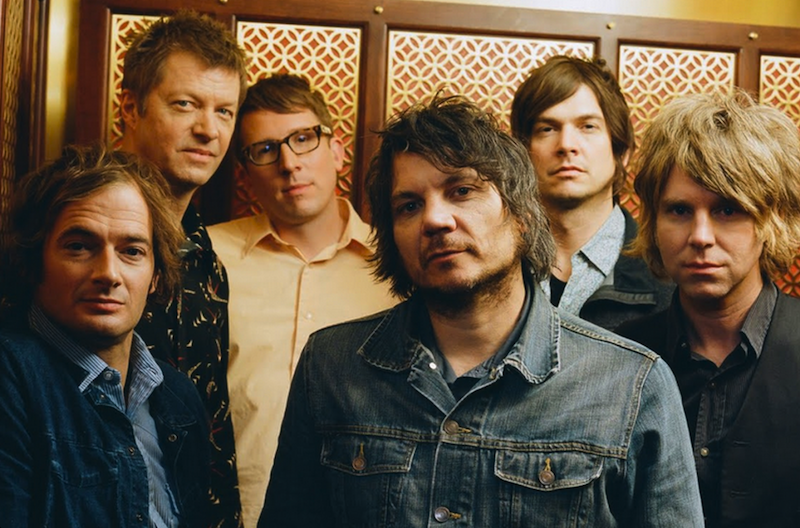
8. Wilco
If Jeff Tweedy and company sought to separate themselves from the strict traditionalism of Americana screed-chislers Uncle Tupelo—well, mission pretty goddamn accomplished. No other band has ever lived out rampant adventurism with less amplified fanfare than Wilco. They perfected the roots-rock epic on 1996’s 2-CD set Being There, preparing their audience not one bit for what was next: an extended collaboration with Billy Bragg featuring unfinished Woody Guthrie songs, the edgy ambrosia of Summerteeth, and something called Yankee Hotel Foxtrot that will forever be justification for sticking to one’s artistic guns. From that point forward there’s just no knowing what they’ll do from album to album: Just as you’re sure they’ve set fire to the yearbooks and stepped into the future, the next release is a valentine to classicism. – Paul Pearson
Essential Recordings: A.M. (1995); Being There (1996); Mermaid Avenue (1998); Summerteeth (1999); Yankee Hotel Foxtrot (2002); A Ghost Is Born (2004); The Whole Love (2011)
Why they aren’t #1: They were my personal choice for #1, so I don’t know what y’all’s problem is. Probably that they lack anthems.

7. Beastie Boys
If all you know about these guys you learned from “(You Gotta) Fight for Your Right (To Party!)” and “Sabotage,” you have all you need in front of you but probably haven’t read between the lines. The Beasties began as a hardcore band; they played CBGB’s and opened for Reagan Youth before their classic rhyme-spitting lineup of MCA, Ad-Rock, and Mike D brought Rick Rubin into the fold. Those two tracks, their longest legacies left to AOR radio and modern-rock stations’ throwback libraries, just scratch the surface of how they restructured rap. Embracing third-eye sampling, playful lyrical interlocking, live energy, and their own instrumental skills from punk to funk, they informed everything from LL Cool J on MTV Unplugged to The Roots. – Adam Blyweiss
Essential Recordings: Paul’s Boutique (1989); Check Your Head (1992); Ill Communication (1994); Hello Nasty (1998)
Why they’re not #1: Off the charts since the early 2000s and willfully out of the spotlight since MCA’s death in 2012, “Sabotage” and other snotty rap stunts loom large in their reputation.
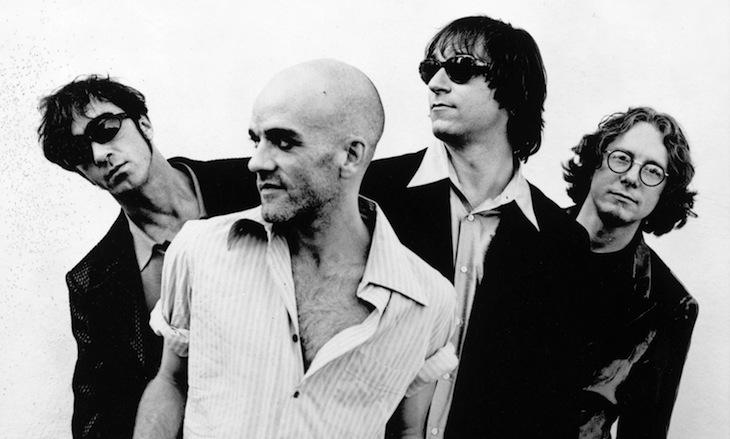
6. R.E.M.
Even though REM’s first album came out in 1983 and helped define “college radio” immediately, 1987’s Document was the album that produced hits. I remember hearing “The One I Love” on mainstream rock radio sandwiched between Bon Jovi and Def Leppard, and being drawn in but its sweet darkness; it was unlike the rest, but was not to be outdone. R.E.M. had a peak year in 1991 with the release of Out of Time, and its lead single, the hook-free but mesmerizing “Losing My Religion.” Automatic for the People is a masterpiece of mood and songwriting, another step in the evolution of a band who, until then, saw no need to take any hard left turns. But turn they did, to mixed reception, and their next five albums were sonically diverse with few hits, but little cohesion or success, which is what kept them off of the top of this list. However, their final two albums, Accelerate and Collapse into Now were among REM’s best, ensuring that their accolades were deserved. – Chad Gorn
Essential Recordings: Green (1988); Automatic for the People (1992); Monster (1994); New Adventures in Hi-Fi (1996); Up (1998); Accelerate (2008); Collapse Into Now (2011)
Why they aren’t #1: Starting from 1988 has a tendency to handicap a band with a lot of great early- to mid-’80s material.
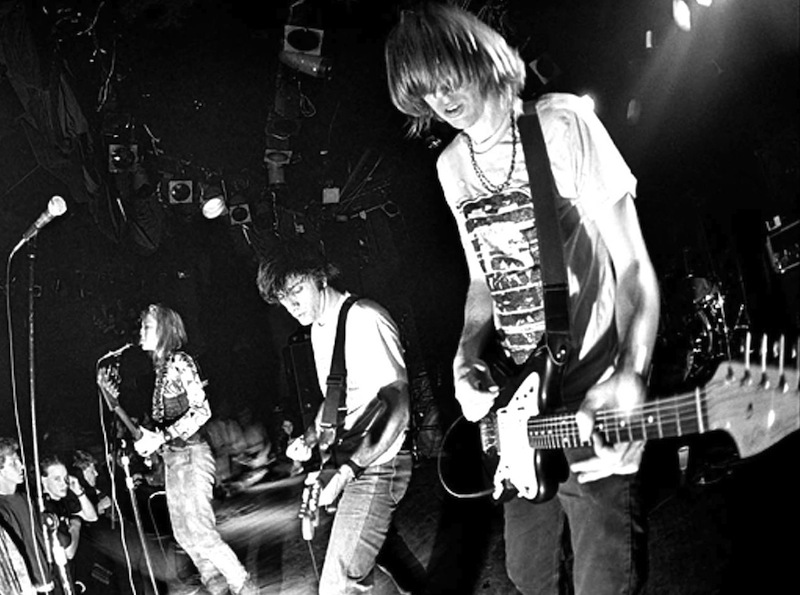
5. Sonic Youth
Nirvana made alternative rock famous, R.E.M. made it unique, Radiohead made it prestigious and Sonic Youth made it fucking weird. If the ultimate goal of any creative art is to stretch the boundaries of the form itself then there can be no more important band than Sonic Youth. The experimental ethos that they passed down to generations and their legendarily hypnotic live shows are all well and good, but then there’s Daydream Nation. The album that simultaneously wrote the indie rock rulebook and burnt it to a crisp. You can have “Teen Spirit” and “Radio Free Europe”; I’ll take “Teenage Riot.” – Wesley Whitacre
Essential Recordings: Daydream Nation (1988); Goo (1990); Dirty (1992); Washing Machine (1995); Murray Street (2002); Sonic Nurse (2004); Rather Ripped (2006)
Why they aren’t #1: Sonic Youth is way too cool for first place.
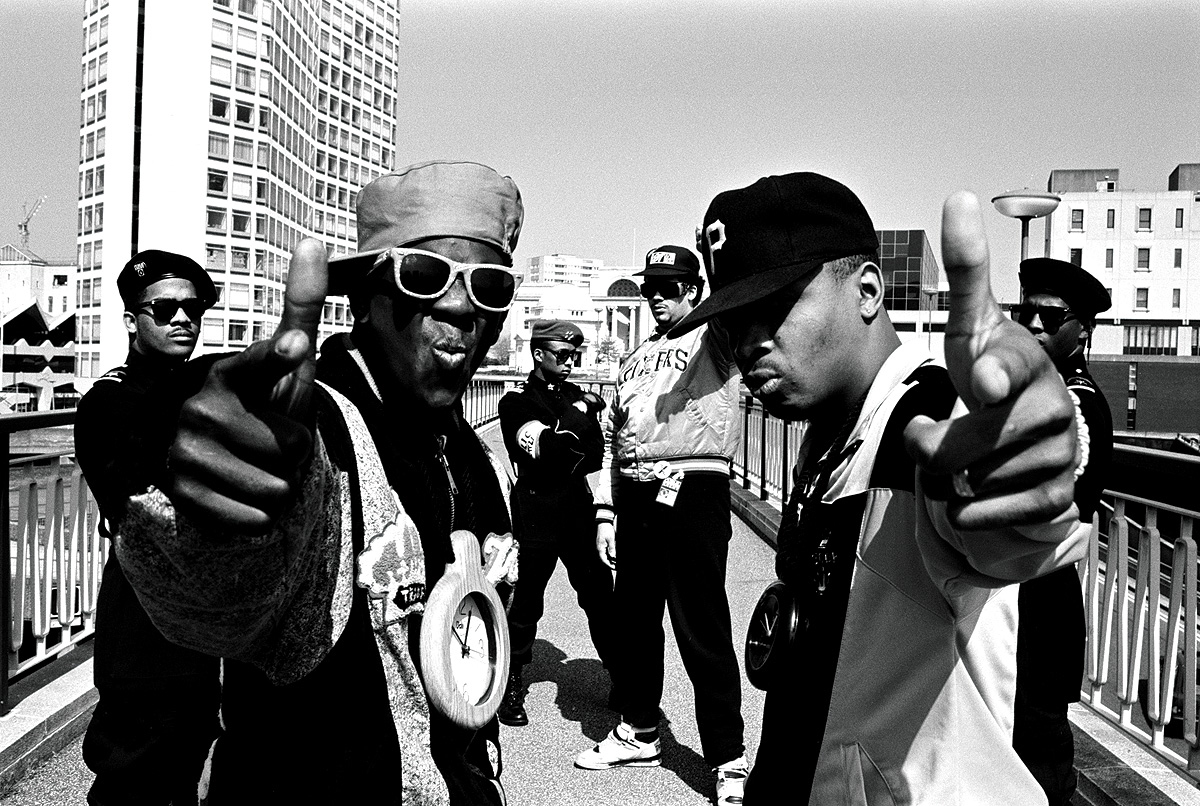
4. Public Enemy
2Pac and Biggie always receive an inordinate amount of credit for rap’s ascendance, but not a soul was as lyrically and musically influential as Public Enemy. Controversial for embracing Louis Farrakhan and Assata Shakur and pumping out music that sounded unlike anything in hip-hop at the moment, PE exploded onto the scene with its second album, 1988’s It Takes A Nation of Millons to Hold Us Back. Chuck D bellowing about staid Black radio and injustice put what became known as conscious rap on the map. Fear of A Black Planet and Apocalypse 91: The Enemy Strikes Black would shape what we now know as the gritty sound of New York hip-hop and define the Golden Era. Just as importantly, PE’s catalog would influence punk and hard rock, as well as groups like Rage Against The Machine and Anthrax, who infamously did their own rap-metal EP, I’m The Man, and teamed with Public Enemy for a metal-infused version of “Bring The Noise.” Undone by personnel changes and spinoffs—original DJ Terminator X did a pair of solo efforts before retiring in 1998 to become a farmer; Chuck D and Flavor Flav both cut unsuccessful individual albums; Professor Griff was ousted amid a scandal, then brought back—as well as unnecessarily judgy (Muse Sick N Hour Message) and flat recordings (New Whirl Odor, There’s A Poison Goin’ On), Public Enemy’s intensity nevertheless remains singular in hip-hop, Slayer sampling and all. – Ernesto Aguilar
Essential Recordings: It Takes a Nation of Millions to Hold Us Back (1988); Fear of a Black Planet (1990); Apocalypse 91: The Enemy Strikes Back (1991)
Why they aren’t #1: The group’s catalog since the early ’90s has been uneven, to put it politely; Flavor of Love
 3. Nirvana
3. Nirvana
When VH1 asked singer Mike Reno why his band Loverboy stopped being so popular after their ‘80s assault on the charts, he smilingly replied, “Nirvana killed my career with their negative lyrics!” Try to forget that Loverboy’s ascent from Canada to immortality was not theretofore a fait accompli; Reno had a point. But that doesn’t mean what Nirvana did wasn’t necessary. Before 1991 there was no American equivalent to the lightning rod the Sex Pistols were to British rock’s postured rhetoric–at least not one everyone agreed on. Nevermind was sarcastic and unstilted, shining a light on the hideous truths that American insincerity had brushed aside. In Utero went even further and, long-term, was no less popular. Then it was done with a shotgun. Now the common response to pop hypocrites is “C’mon, give his presidency a chance.” I hope one of you kids in earbuds is listening to Nirvana and taking notes. – Paul Pearson
Essential Recordings: Bleach (1989); Nevermind (1991); In Utero (1993)
Why they’re not #1: Their career was interrupted.

2. Sleater-Kinney
Emerging from the Olympia, Washington punk scene and graduating to international prominence through a careful combination of accessible indie sensibility with equal punk fury. As fiery live as they were on their breakout album Dig Me Out, Sleater Kinney remain powerful purveyors of thoughtful and intelligent feminist themes in rock—with kickass riffs at that. Critically adored, tenacious and influencing legions of imitators, it’s easy to see why Sleater Kinney is so vital to music in the past 30 years. While the bar for male indie artists always seems that much lower, Sleater-Kinney can go face-to-face with the most intense and virtuosic underground artists and still come out on top. At heart, however, Sleater-Kinney are punk rock, and that independent spirit is what’s at the heart of their catalog of abrasive, anthemic standouts. – Brian Roesler
Essential Recordings: Call the Doctor (1996); Dig Me Out (1997); The Hot Rock (1999); All Hands on the Bad One (2000); One Beat (2002); The Woods (2005); No Cities to Love (2015)
Why they’re not #1: They’re not here ’cause they want to entertain.
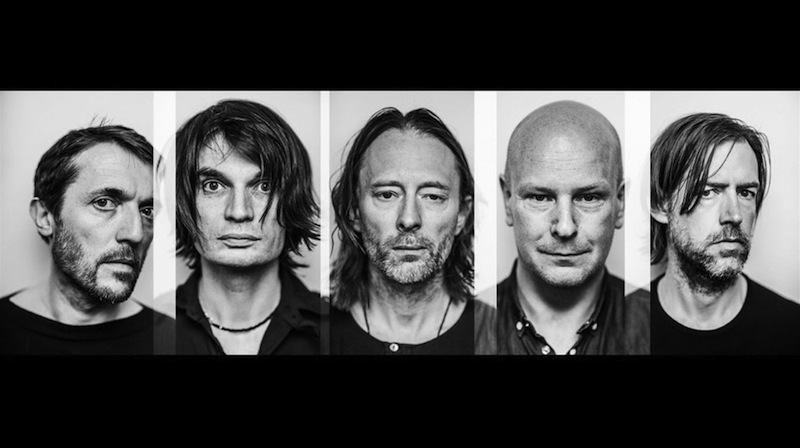
1. Radiohead
Old-timers shake their heads at the past generation and a half—no Beatles, no Elvis Presley, no Led Zeppelin, virtually no Rolling Stones. Yet the last three decades have been remarkable for popular music. Folk and blues inspirations of rock music’s legends, as well as two- and three-part harmonies, have seen a watershed of growth via technology and genre cross-pollination. The evolution of popular music is nowhere as exquisitely as crystallized as in Radiohead, the English quintet that has sold over 30 million records worldwide. The secret is simple yet nearly impossible to attain. Year after year, Thom Yorke’s at-times hard-to-watch vulnerability has cascaded into an aural sea of synthesizers, guitars, rhythm and soaring arrangements to grand effect, consistently. Radiohead’s mercurial mingling of styles and seemingly effortless ability to forge wholly formed and original concepts has cast a shadow over popular music that not only steers today’s course, but is certain to move countless bands to form in the coming years. And just when it seems Radiohead has hit a creative peak, they surprise with where they go next. Could there really be another number one? The band’s discography is iconic and instantly recognizable. Albums such as 1997’s OK Computer and 2000’s Kid A are classics that inarguably determined the direction for modern rock music as well as electronica and indie pop, before most audiences surely considered indie pop a distinct class. Hail to the Thief (2003) took on the War on Terror when few acts in the same stratosphere were willing to be so open about it emotionally. The digital release of 2007’s In Rainbows was prescient to our streaming age today. Yet Radiohead’s adventuresome musical and cultural vision has never overshadowed what it fundamentally still does best: intelligent songwriting that wrangles with the human condition and is a salve for our collective wounds. The band’s lighter output in the last decade—2011’s The King of Limbs and A Moon Shaped Pool (2016) have been their only albums since 2007—has only hastened a more prodigious mythology that has elevated Radiohead further. From vaulting into our mind’s eye with 1993’s “Creep” to divergent pairings with the likes of Hans Zimmer to seeing a Rock & Roll Hall of Fame nomination in 2017, the group’s first year of eligibility, Radiohead’s missteps have been few, and their successes legion. Some might believe mentioning Yorke, Colin Greenwood, Jonny Greenwood, Ed O’Brien and Philip Selway in the same breath as those aforementioned megastars to be heresy. They would be wrong. – Ernesto Aguilar
Essential Recordings: The Bends (1995); OK Computer (1997); Kid A (2000); Amnesiac (2001); Hail to the Thief (2003); In Rainbows (2007); A Moon Shaped Pool (2016)


 10. Nine Inch Nails
10. Nine Inch Nails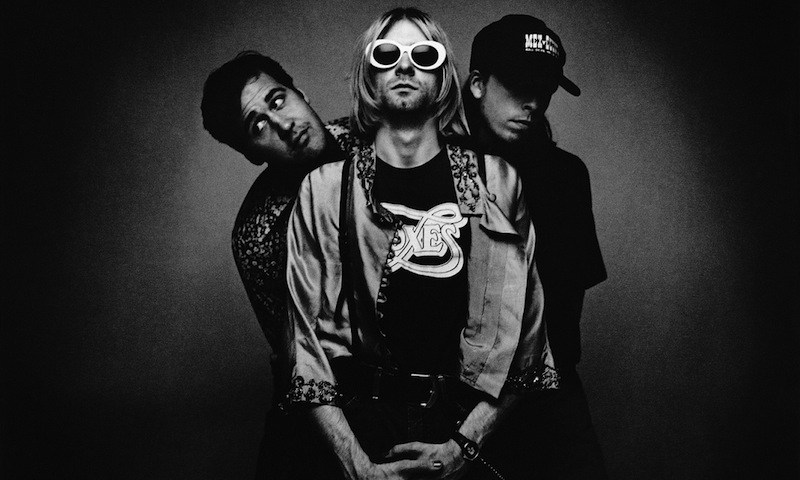 3. Nirvana
3. Nirvana
Would’ve slotted Melvins in there somewhere. Bands like MBV only released a flawless album but did not much else in terms of being a band in the last 30 years. Good list though. Good to see ATCQ in there.
I agree with FEW of these but I do agree with number one choice! RADIOHEAD #1 Hail to the best band of the past 30 years!
Excuse me, it seems that you forgot to put Muse on this list…
I was expecting them to be near the end, but they were not! At least Radiohead won.
Saw Radiohead in 1992 and they were poor… saw The God Machine a few weeks later at the same venue, they were incredible… Oh how fate plays out in music.
Best at what?
Needlepoint. Juggling. Pig calling.
No Dinosaur Jr., Smashing Pumpkins, Kyuss, Death, Bad Religion, Mars Volta – but Baroness. Come on guys.
It all came down to the vote. Dinosaur Jr. is definitely one of the most consistently great bands of the past 30 years. Smashing Pumpkins was for about a decade, then it all went downhill. Death obviously were great but they didn’t make that many individual lists, unfortunately. But The Mars Volta? If you had said At the Drive-In, maybe…
Maybe I missed it, but I didn’t see weezer on this list. That invalidates the list (unless it’s an issue of dates). Weezer is a better band and a more influential band and had more and better hits than at least 30% of this list. Don’t hate them because they’ve put out garbage, they’ve also put out and continue to put out really good shit
This list is invalidated because a band that you acknowledge puts out garbage isn’t there? OK…
No Melvins, The Jesus Lizard, The Breeders ,but fucking Wilco and Radiohead in top 5?
Imagine dragons One republic Maroon 5 Lincoln Park Weezer Wu Tang
Clan. Wtf. Where are all these bands?
Queens of the Stone Age, Spoon, Soundgarden destroy half if not most of these bands. Appreciate the Nick Cave and Wilco inclusions.
Where the fuck is TOOL!?!?!?!?
Come on guys I would have used 25 of the spots differently..!
RHCP?! Muse? Oasis? Foo fighters? Linkin Park? Offspring? Blink? Maaany names missing and a lot in there could’ve been missed.